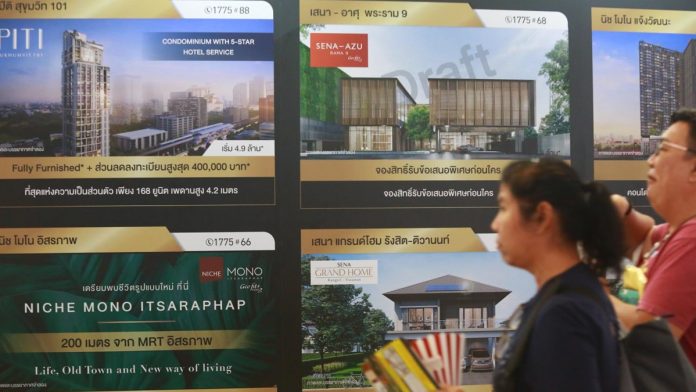Residential property market growth this year has been cut to 3-5% from 5-7% following lowered GDP growth forecasts of 1.5-2.5% amid the spread of the recent coronavirus outbreak, says the Real Estate Information Center (REIC).
Vichai Viratkapan, REIC’s acting director-general, said the outbreak is a new threat that will have a strong impact on the global and domestic economies.
“Despite property incentives and lower interest rates, market sentiment will be unfavourable because of the impact of the outbreak on economic systems,” he said.
Last week, the National Economic and Social Development Council lowered its 2020 forecast of economic growth to 1.5-2.5% from the 2.7-3.7% forecast made in November.
Mr Vichai said a key factor for this revision is the forecast of weak residential transfers from Chinese buyers.
In a base case scenario, the number of units transferred nationwide will drop 4.5% to 356,661 units, down from an earlier forecast with a dip of 0.2%.
The worst case is a nosedive of 14% to 320,995 units and the best case is growth of 3.9% to 387,927 units.
The transfer value in the base case scenario is expected to drop 6.1% to 822 billion baht. The worst case is a decline of 15.5% to 740 billion baht and the best case is a rise of 2.8% to 900 billion.
In 2019, the number of residential units transferred nationwide rose 2.7% to 373,365 units, worth a combined 875 billion baht, an increase of 4.3% from 2018.
The amount and value was higher than forecast at -8.4% and -8.2%, he said.
“Developers learned from the impact of the loan-to-value limits and unfavourable market sentiment in the second half last year,” said Mr Vichai. “This will help control excessive supply this year.”
Somprawin Manprasert, chief economist, head of research and executive vice-president at Bank of Ayudhya, said there were three factors hammering at economic growth. The biggest one was the coronavirus outbreak that will affect GDP by 0.4 percentage points through global tourism losses.
“The epidemic is a major concern because China’s economy is huge,” he said on Tuesday at a property seminar.
China plays a large role in the world’s tourism market as it accounts for 20% of the sector, up from 3% in 2002.
The outbreak also affects the global supply chain because a lot of materials cannot be exported from China. This will also lead to unemployment, said Mr Somprawin.
“The virus impact will severely hit the Thai tourism sector in the first quarter before the sector gradually improves in the second quarter and bounces back on pent-up tourist arrivals from the third quarter,” he said.
Positive sentiment in the property market will return in the second half, said Mr Somprawin.
“The coronavirus outbreak is not terrifying because the mortality rate is very low at 2%,” he said. “The disease will peak in March-April with 20,000 infections per week. The number of cases will stabilise in May and become much lower after that.”
Drought will cut GDP growth by 0.3%, with an expected loss of 20 billion baht for the agricultural sector if the water shortage lasts until May, which could reach 40 billion by September, said Mr Somprawin.
The delay in government spending will hurt GDP growth by 0.1% as around 150 billion baht from a total of 400 billion for megaprojects will be postponed.
“The good news is interest rates are falling and the loan-to-value limits should be eased,” he said.
Thanavath Phonvichai, president of the University of the Thai Chamber of Commerce, said there are positive factors such as the decreasing rate of coronavirus infections and greater political stability after the dissolution of the Future Forward Party.
“The tourism industry will recover in September as the outbreak will end within June,” he said.
Mr Thanavath suggests potential homebuyers make a decision this year because they are likely to get a good price.
Source : Bangkokpost.com














